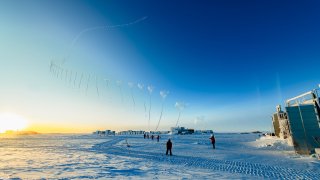
Sea ice that packs the ocean around Antarctica hit record low levels this winter, the U.S. National Snow and Ice Data Center (NSIDC) said on Monday, adding to scientists’ fears that the impact of climate change at the southern pole is ramping up.
Researchers warn the shift can have dire consequences for animals like penguins who breed and rear their young on the sea ice, while also hastening global warming by reducing how much sunlight is reflected by white ice back into space.
Antarctic sea ice extent peaked this year on Sept. 10, when it covered 16.96 million square kilometers (6.55 million square miles), the lowest winter maximum since satellite records began in 1979, the NSIDC said. That’s about 1 million square kilometers less ice than the previous winter record set in 1986.
Get Philly local news, weather forecasts, sports and entertainment stories to your inbox. Sign up for NBC Philadelphia newsletters.
NSIDC in a statement said that the figures were preliminary with a full analysis to be released next month.
Seasons are reversed in the Southern hemisphere with sea ice generally peaking around September near the end of winter and later melting to its lowest point in February or March as summer draws to a close.
The summer Antarctic sea ice extent also hit a record low in February, breaking the previous mark set in 2022.
U.S. & World
Stories that affect your life across the U.S. and around the world.
Read the full story on NBCNews.com.



